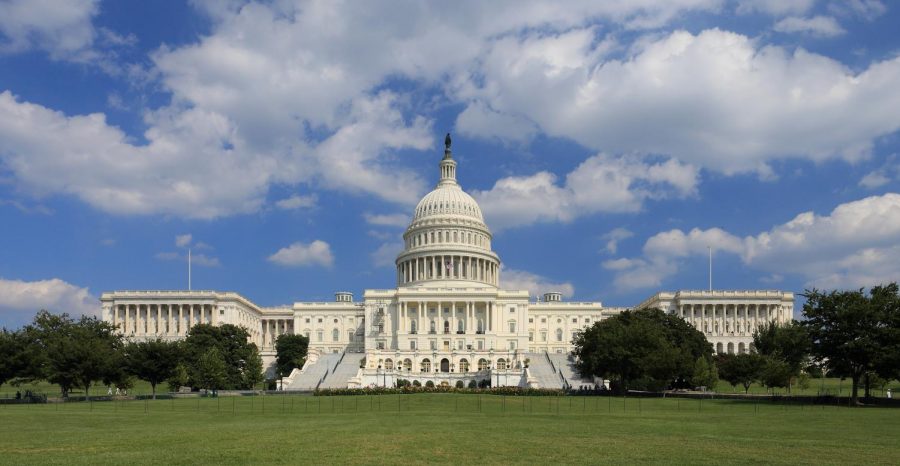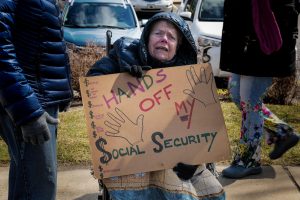A historical impeachment: the Senate trial and a verdict
The second impeachment trial of Donald Trump began on Feb. 9, 2021 and ended on Feb. 13, 2021 with an acquittal for the former president.
February 25, 2021
On Feb. 9, 2021, the second impeachment trial of former president Donald Trump began in the United States Capitol. After the trial, Democrats were unable to get enough votes for a two-thirds majority in the Senate, and former president Trump was acquitted on the charges of inciting insurrection.
The trial started with four hours of debate from both sides on whether or not the trial was constitutional. There had been speculation as to whether the Senate actually has the power to impeach a former president under the Constitution of the United States.
The House Managers, led by Democratic Representative Jamie Raskin of Maryland, argued that the trial should continue as it was, in fact, constitutional. The team began with showing a graphic video showcasing the more violent footage of the Capitol riots that took place on Jan. 6 and then argued the validity of the defense’s First Amendment argument, which they highlighted in their pretrial brief.
Raskin stated that incitement to violence is not protected under the First Amendment and gave the example of running into a crowded theatre and shouting “fire,” saying that what Trump did was actually far worse.
“It’s more like a case where the town fire chief, who’s paid to put out fires, sends a mob, not to yell fire in a crowded theater, but to actually set the theater on fire,” Raskin said. “And who then, when the fire alarms go off and the calls start flooding into the fire department asking for help, does nothing but sit back, encourage the mob to continue its rampage and watch the fire spread on TV with glee and delight.”
Trump’s lawyers, Bruce Castor and David Shoen, went a very different route than the prosecution and many people were surprised at the weak foot on which they started. Castor, who went first, spent his time rambling, and Shoen’s arguments were seen more as a political attack than a viable defense.
In the end, however, the defense’s argument became a little more clear. On one hand, the trial was unconstitutional and the Senate did not have the power to impeach a former office holder, and on another, Donald Trump was not responsible for inciting the riots on Jan. 6 because the wording he used in his rally, hours prior, was figurative and he didn’t mean to cause violence.
“Presidents are impeachable because presidents are removable. Former presidents are not because they cannot be removed,” David Shoen said.
In the end, the Senate voted 57 to 43 that the trial was constitutional, most of them claiming to be emotionally moved by the prosecution’s video and argument.
Following the constitutional vote, each side was given sixteen hours, eight hours per day, to present their arguments for or against the impeachment of Donald Trump.
The prosecution went first and argued Trump’s role in the Jan. 6 Capitol riots by using the words of Trump and his supporters as evidence for the majority of their case. More videos of the horrific events of that day were shown, tweets of the Presidents were particularly condemning, and the words of his supporters also proved his role in the attack.
On Dec. 26, Trump wrote, “The ‘Justice’ Department and the FBI have done nothing about the 2020 President Election Voter Fraud, the biggest SCAM in our nation’s history, despite overwhelming evidence. They should be ashamed. History will remember. Never give up. See everyone in D.C. on January 6th.”
On Day 2, house managers also pointed out the role that racism played in the Capitol riots, explaining that many of the rioters had connections to far-right and white supremacist groups, some even going as far as carrying the Confederate flag into the building. They connected these people’s obsession with the president and his loss of the 2020 election to Trump’s refusal to condemn any of their actions publicly.
On Day 3, the House Managers wrapped up their case with a few more pieces of evidence to prove that the insurrection happened with Trump’s invitation, and a message for senators saying that if they did not vote to convict, it would set a dangerous precedent for leadership in this country.
California Representative Ted Lieu, one of the house managers, said, “President Trump’s lack of remorse and refusal to take accountability during the attack shows his state of mind. It shows that he intended the events of Jan. 6th to happen. And when it did, he delighted in it. “
The defense only took three hours to present their case on Day 4 of the impeachment trial and got praise from Republican senators since it was quite the step up from Day 1 and their rambling opening statement.
Much like the prosecution, the defense brought their own video montages and used the Democrats’ words against them. They argued that Trump’s tweets and words leading up to Jan. 6 were taken out of context,and the videos showed a series of Democratic politicians saying the word “fight” in political speeches. The videos were shown in order to combat the prosecution’s argument that Trump’s statements were made in order to incite violence by giving examples of the other side using similar words that Trump spoke at the rally before the riots. They also continuously said that there was no due process or respect for all of the accused citizen’s rights, involved in the impeachment.
“Like every other politically motivated witch hunt the left has engaged in over the past four years, this impeachment is completely divorced from the facts, the evidence and the interests of the American people,” said Micheal T. van der Veen, one of Trump’s lawyers.
Following Trump’s short defense, senators were able to ask questions to both sides and closing arguments began the following day.
“Senators, this cannot be the beginning. It can’t be the new normal,” said Democratic Representative Joe Neguse of Colorado, one of the house managers, “It has to be the end. That decision is in your hands.”
Van der Veen’s closing remarks held far different sentiments than those of the prosecution.
“At no point did you hear anything that could ever possibly be construed as Mr. Trump encouraging or sanctioning an insurrection,” Van der Veen said. “The act of incitement never happened. He engaged in no language of incitement whatsoever on Jan. 6 or any other day following the election.”
In the end, a 57-43 vote acquitted former president Donald Trump for the second time. The vote was disappointing for many, but nonetheless historical. With seven Republican senators, Richard M. Burr of North Carolina, Bill Cassidy of Louisiana, Susan Collins of Maine, Lisa Murkowski of Alaska, Mitt Romney of Utah, Ben Sasse of Nebraska and Patrick Toomey of Pennsylvania, Trump’s acquittal held the most bipartisan support for any impeachment conviction in history.
Senate minority leader Mitch McConnell voted not-guilty as the country expected, but said a surprising few words minutes after the verdict.
“There is no question – none – that President Trump is practically and morally responsible for provoking the events of the day,” McConnell said. “The leader of the free world cannot spend weeks thundering that shadowy forces are stealing our country and then feign surprise when people believe him and do reckless things.”
McConnell believes that Trump is guilty, but can only be convicted under the American Justice System, as it is not in the Senate’s jurisdiction to impeach a former president.
“He didn’t get away with anything yet,” McConnell said.












